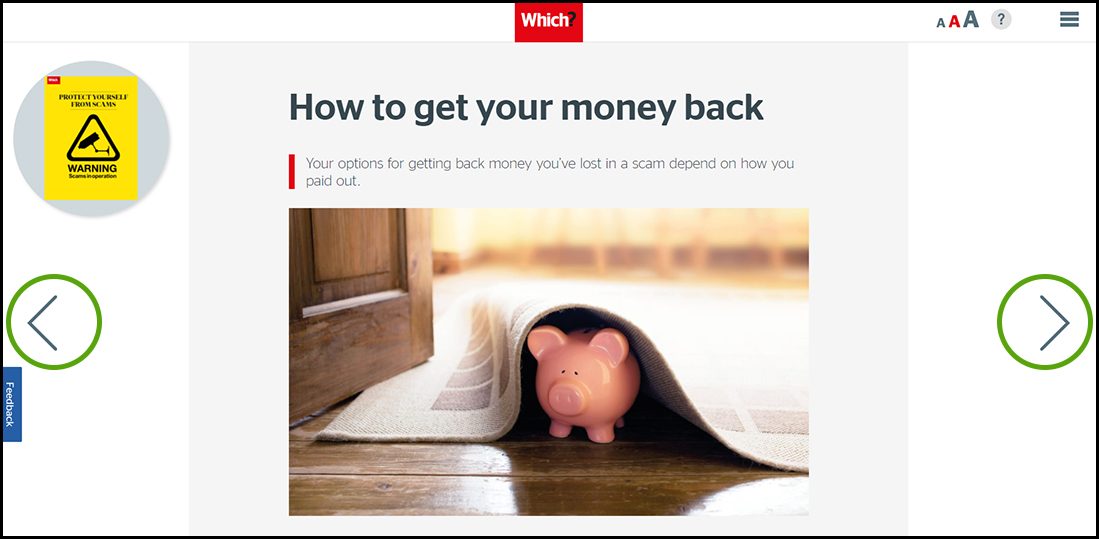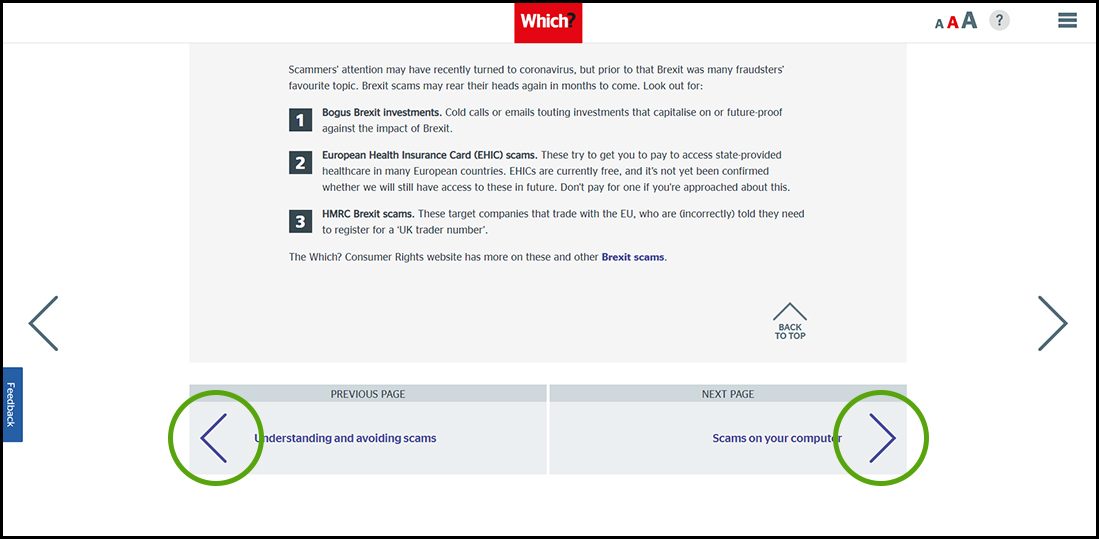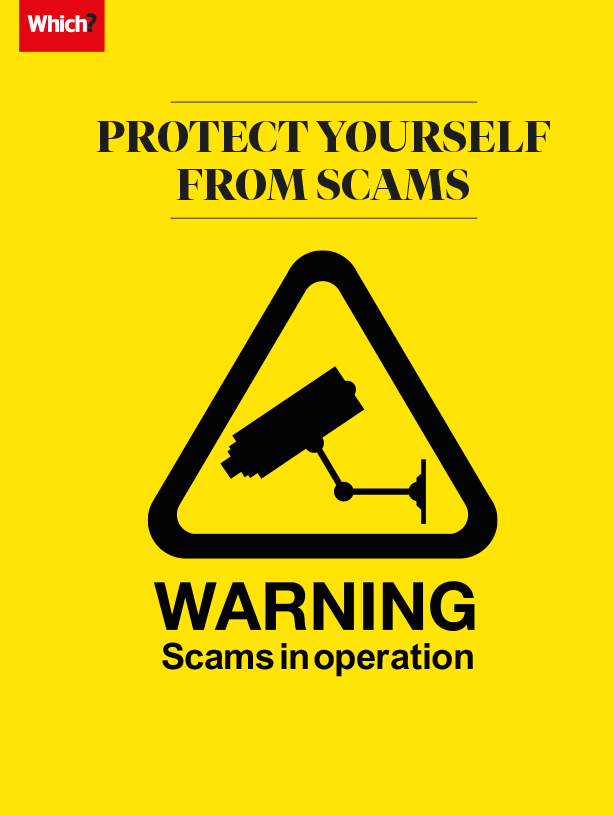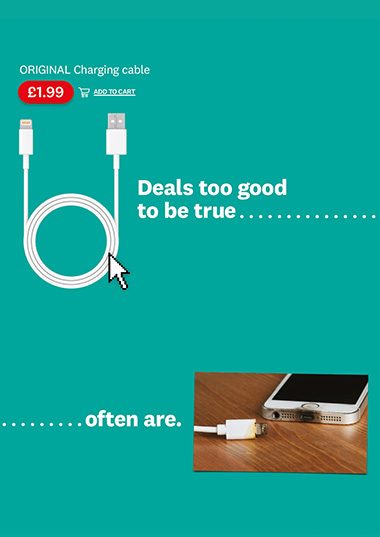User guide
Finding your way around the guide
To navigate between pages, click or tap the arrows to go forwards to the next page or backwards to the previous one. The arrows can be found either side of the page and at the bottom, too (circled in green, below).


Menu/table of contents
Click or tap on the three horizontal lines in the top-right of your screen to open the main menu/table of contents. This icon is always visible whether you're using a computer, tablet or smartphone. The menu will open on top of the page you’re on. Click on any section title to visit that section. Click the cross at any time to close the table of contents.
Text size
On a computer, you'll see three different sized letter 'A's in the top-right of your screen. On a smartphone or tablet these are visible when you open the menu (see above). If you’re having trouble reading the guide, click or tap on each of the different 'A's to change the size of the text to suit you.
Pictures
On some images you'll see a blue double-ended arrow icon. Clicking or tapping on this will expand the picture so you can see more detail. Click or tap on the blue cross to close the expanded image.
Where we think a group of images will be most useful to you, we've grouped them together in an image gallery. Simply use the blue left and right arrows to scroll through the carousel of pictures.
Links
If you see a word or phrase that's bold and dark blue, you can click or tap on it to find out more. The relevant website will open in a new tab.
Jargon
If you see a word or phrase underlined, click or tap on the word and small window will pop up with a short explanation. Close this pop-up by clicking or tapping the cross in the corner.
Help
On a computer, you'll see a question mark icon in the top-right of your screen. On a smartphone or tablet this is visible when you open the menu (see above).
Clicking or tapping on the question mark will open this user guide. It opens on top of the page you're on and you can close it any time by clicking or tapping the cross in the top-right corner.

How scammers take advantage of uncertain times
Exceptional situations such as the coronavirus pandemic and Brexit have offered rich pickings for scammers.
When a topic dominates the news headlines and our daily lives, it can be hard to tell fact from fiction. This uncertainty is invaluable for scammers, who will try to take advantage of an issue’s high profile, our legitimate concerns and potentially mixed messages from genuine sources to entrap us in a vulnerable moment.
The experts at Which? have been pulling out the stops to support you during the coronavirus crisis – whether you're seeking information on your flight cancellation rights, the best way to sanitise your house or how to steer clear of scams.
Visit our website for all our latest news and advice, plus our reviews of the best products and services to make lockdown as pleasant as possible.
Coronavirus scams
The global COVID-19 pandemic has created the perfect environment for fraudsters, due to the shortage of essential items and the need to protect ourselves and our loved ones.
As of 22 July 2020, fraud and cybercrime reporting centre, Action Fraud (covering England, Wales and Northern Ireland) had received more than 3,000 reports of coronavirus-related fraud, with losses totalling more than £13 million. It had also received more than 14,500 reports of coronavirus-related ‘phishing’ emails, which mimic an official body such as HMRC in order to trick recipients into passing on their personal data and banking details. Scams during this period included:
- Essential coronavirus advice: emails and texts that purport to be from the World Health Organization (WHO) or the US Centers for Disease Control and Prevention ask you to click on a link to get important coronavirus advice. The websites look legitimate, but they ask for personal details before they’ll release any advice. Clicking on links may install malware Malware Short for malicious software, such as viruses and ransomware. on your computer.
- Fake lockdown fines: these messages claim to be from the government and state you’ve been fined for stepping outside during lockdown. Scammers are now using this tactic by phone, too.
- HMRC ‘goodwill payments’: the Met police have warned about a message that states: ‘As part of the NHS promise to battle the COVID-19 virus, HMRC has issued a payment of £258 as a goodwill payment’. You’ll then be asked for your bank details to receive the (non-existent) payment.
- Conspiracy theories: messages full of doom-laden warnings, laced with links that could take you to phishing sites or install malware on your device.
- Fake face mask and hand sanitiser sales: criminals may try to sell you protective face masks, hand sanitiser and similar at hugely inflated prices. These products are unlikely to work properly and may not even materialise. Read more about how to avoid fake and dangerous products on our site.
- WhatsApp request to forward your code: more of us used WhatsApp in lockdown, and sometimes for the first time. If a scammer discovers your phone number, they can request to register your WhatsApp account on a different phone. Doing so requires a verification code to be sent to your phone; scammers can try to persuade targets to forward them this code. This could give them full access to your WhatsApp messages, photos, videos and contacts.
- Doorstep scams: we’ve seen reports of a particularly unpleasant scam targeting older people, where criminals knock on doors and attempt to gain access – for example, by offering to take the home owner’s temperature. Residents can then be robbed.
For many of us, reading product reviews has become an essential step in the online-shopping process. Reviews often provide a sense of trust – especially when we're purchasing less-familiar products, like masks and other tools designed to make our lives easier during the coronavirus pandemic. Sellers understand this, and some have taken steps to artificially boost their ratings. Visit our site to learn more about how to spot a fake review.
How to avoid coronavirus scams
In addition to the advice on avoiding other scams, watch out for unsolicited correspondence supposedly from health bodies such as the NHS or the WHO. Report any scams you spot as this will help to stop them in future. A scammer sending coronavirus smishing SmishingPhishing via SMS (mobile text message) texts had been caught and subsequently jailed for 30 weeks.
Carefully scrutinise any claims circulating via social media; if in doubt, a fact-checking website may shed light. Full Fact and Channel 4 News FactCheck were set up to debunk fake news.
Visit our site for more on coronavirus scams.
During the coronavirus outbreak, many of us have been shopping online more often. While this can be a great way to get a good deal, we've seen unscrupulous online sellers trying to sell goods at inflated prices. This is known as price gouging, where people take essential in-demand items and hike up the prices. During COVID-19 these include cleaning products, hand sanitisers and thermometers.
We are campaigning to stop price gouging – we're calling on the government to introduce legislation to stop price gouging during times of emergency. Visit our site to find out more.
If you've seen evidence of price gouging, you can report it to us on our campaign page and we'll take these reports to the government.
Brexit scams
Scammers’ attention may have recently turned to coronavirus, but prior to that Brexit was many fraudsters’ favourite topic. Brexit scams may rear their heads again in months to come. Look out for:
- Bogus Brexit investments. Cold calls or emails touting investments that capitalise on or future-proof against the impact of Brexit.
- European Health Insurance Card (EHIC) scams. These try to get you to pay to access state-provided healthcare in many European countries. EHICs are currently free, and it’s not yet been confirmed whether we will still have access to these in future. Don’t pay for one if you're approached about this.
- HMRC Brexit scams. These target companies that trade with the EU, who are (incorrectly) told they need to register for a ‘UK trader number’.
The Which? Consumer Rights website has more on these and other Brexit scams.



